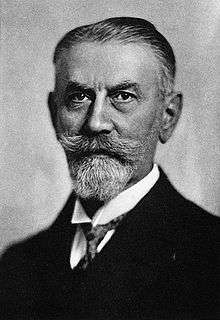Eugen von Hippel
Eugen Adolf Arthur von[1] Hippel (3 August 1867 – 4 July 1939) was a German ophthalmologist born in Königsberg.

Early life, education, and training
He studied medicine in Heidelberg under ophthalmologist Theodor Leber (1840–1917) and neurologist Wilhelm Heinrich Erb (1840–1921).
Career
In 1897, Hippel attained the title of "professor extraordinary" at Heidelberg, and in 1909 became a professor at the eye clinic in Halle. In 1914, he became a professor of ophthalmology in Göttingen.
In 1904, Hippel described a rare disorder of the retina, and in 1911 discovered the anatomical basis of this disease, which he named "angiomatosis retinae". However it wasn't until 1926 that Swedish pathologist Arvid Lindau recognized an association between angiomatosis of the retina with hemangioblastomas of the cerebellum and other parts of the central nervous system. This condition is known today as Von Hippel–Lindau disease (VHL).
Hippel contributed several writings to textbooks regarding anatomy and diseases of the eye. He was the son of Arthur von Hippel (1841-1916), a pioneer in corneal transplantation, and an uncle to German-American physicist Arthur R. von Hippel (1898-2003).
External links
- VHL Family Alliance (biography of Eugen von Hippel)
References
- In German personal names, von is a preposition which approximately means of or from and usually denotes some sort of nobility. While von (always lower case) is part of the family name or territorial designation, not a first or middle name, if the noble is referred to by surname alone in English, use Schiller or Clausewitz or Goethe, not von Schiller, etc.